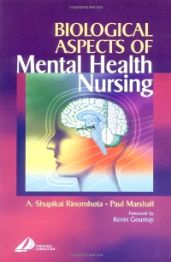Biological Aspects of Mental Health Nursing, 1st Edition
Date of Publication: 09/2000
Over the past two decades there has been a remarkable explosion in the understanding of the biological basis of the brain and the impact of that on behaviour. Furthermore, developments in pharmacological therapeutic approaches continue at a tremendous rate. Yet, although there are many mental health nursing textbooks available, veryfew address this significant aspect of mental health in any depth. Clearly, in order to deliver informed holistic care, it is vital that practitioners appreciate the biological aspects of mental health problems and the associated implications for clients, families and the practitioner.
This book aims to provide a broad overview of the neurobiological factors which may contribute to, and arise from, the development of mental health problems, and seeks to clearly identify issues relevant to mental health nursing practice. Key issues addressed include:
The important role of homeostasis in maintaining physical and emotional well-being
The important link between immunology and nutrition and mental health
The co-ordinated role of neuro-function and endocrine function in influencing behaviour
Adaptive and maladaptive responses of the body to stress and stressors
Ageing process as a continuum of life and its relation to mental health
Restorative function of sleep
This book aims to provide a broad overview of the neurobiological factors which may contribute to, and arise from, the development of mental health problems, and seeks to clearly identify issues relevant to mental health nursing practice. Key issues addressed include:
The important role of homeostasis in maintaining physical and emotional well-being
The important link between immunology and nutrition and mental health
The co-ordinated role of neuro-function and endocrine function in influencing behaviour
Adaptive and maladaptive responses of the body to stress and stressors
Ageing process as a continuum of life and its relation to mental health
Restorative function of sleep
Over the past two decades there has been a remarkable explosion in the understanding of the biological basis of the brain and the impact of that on behaviour. Furthermore, developments in pharmacological therapeutic approaches continue at a tremendous rate. Yet, although there are many mental health nursing textbooks available, veryfew address this significant aspect of mental health in any depth. Clearly, in order to deliver informed holistic care, it is vital that practitioners appreciate the biological aspects of mental health problems and the associated implications for clients, families and the practitioner.
This book aims to provide a broad overview of the neurobiological factors which may contribute to, and arise from, the development of mental health problems, and seeks to clearly identify issues relevant to mental health nursing practice. Key issues addressed include:
The important role of homeostasis in maintaining physical and emotional well-being
The important link between immunology and nutrition and mental health
The co-ordinated role of neuro-function and endocrine function in influencing behaviour
Adaptive and maladaptive responses of the body to stress and stressors
Ageing process as a continuum of life and its relation to mental health
Restorative function of sleep
This book aims to provide a broad overview of the neurobiological factors which may contribute to, and arise from, the development of mental health problems, and seeks to clearly identify issues relevant to mental health nursing practice. Key issues addressed include:
The important role of homeostasis in maintaining physical and emotional well-being
The important link between immunology and nutrition and mental health
The co-ordinated role of neuro-function and endocrine function in influencing behaviour
Adaptive and maladaptive responses of the body to stress and stressors
Ageing process as a continuum of life and its relation to mental health
Restorative function of sleep
Key Features
Author Information
By Shupi Rinomhota, Department of Allied Health Sciences, Leeds College of Health Studies, Leeds General Infirmary, Leeds, UK and Paul Marshall, Department of Allied Health Sciences, Leeds College of Health Studies, Leeds General Infirmary, Leeds, UK




